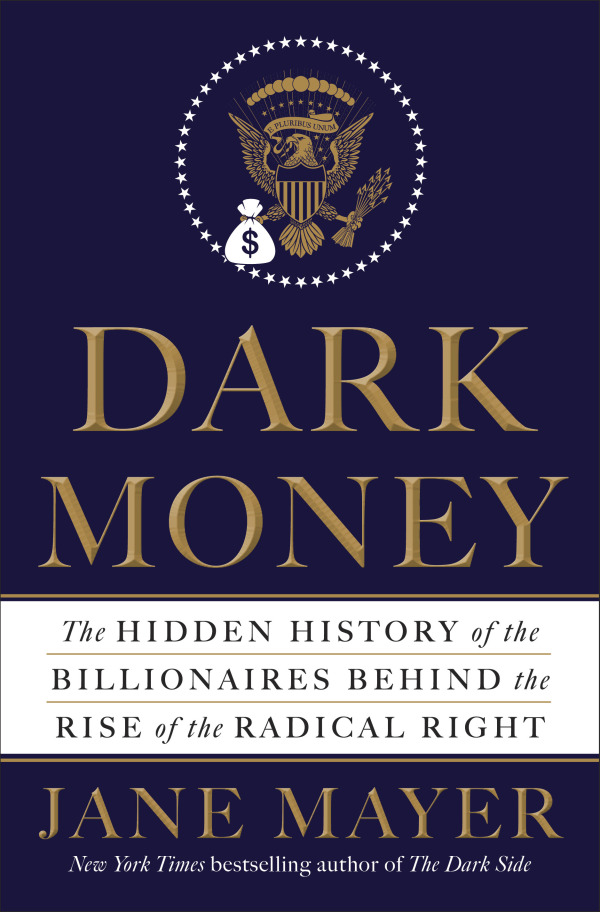BY JONATHAN VALANIA William S. Burroughs famously said “A paranoid is someone who knows a little of what’s going on.” Cold comfort for the likes of Hillary Clinton who was widely derided back in 1998 for claiming there was “a vast right wing conspiracy” leveraging its colossal wealth and powers of persuasion to bring down the Clintons and the liberal progressive agenda they had come to represent (if not quite embody). Dark Money, the latest must-read by acclaimed investigative journalist and New Yorker staff writer Jane Mayer, reveals overwhelming and incontrovertible evidence that Clinton was in fact right. And then some. Mayer pulls back the curtain on a shadowy cabal of oligarchs, marshaled by the noxious Koch brothers in secret annual gatherings, who are spending hundreds of millions of dollars to essentially hijack American democracy in the ruthless pursuit of their toxic right-wing agenda. Dark Money puzzles together how a handful of super-wealthy heirs to spectacular family fortunes spending their parents’ money and adopting their parents’ reactionary politics, have managed — through a dizzying array of think tanks, academic endowments, and astroturf front groups, all financed in intentionally complicated and convoluted ways that make it almost impossible to trace back to their funding sources — to not only  reshape the public debate but effectively roll back the will of the American electorate. Making all of this doubly insidious is the fact that they have done it largely in the name of charitable giving through an ever-growing number of private foundations. Consider this: in the 1930s, there were 300 private foundations, by 1950 there were 2000, by 1985 there were 30,000. As of 2013, there were 100,000 so-called charitable foundations in America in control of $800 billion worth of assets, absent any requirements of transparency or accountability despite benefiting from public largess in the form of generous tax breaks.
reshape the public debate but effectively roll back the will of the American electorate. Making all of this doubly insidious is the fact that they have done it largely in the name of charitable giving through an ever-growing number of private foundations. Consider this: in the 1930s, there were 300 private foundations, by 1950 there were 2000, by 1985 there were 30,000. As of 2013, there were 100,000 so-called charitable foundations in America in control of $800 billion worth of assets, absent any requirements of transparency or accountability despite benefiting from public largess in the form of generous tax breaks.
Mayer calls it “weaponizing philanthropy,” a direct consequence of the tax code that encourages philanthropic giving as a way of avoiding the inheritance tax. When you combine weaponized philanthropy with SCOTUS’ corrosive Citizen’s United decision — based on the gravity-defying premises that corporations are people and money is speech — you get the category five shitstorm currently making landfall on the undefended shores of American democracy. The fact that the Koch Brothers’ confederacy of plutocrats has vowed to spend $889 million to influence the outcome of the 2016 presidential election now under way should strike fear in the hearts of anyone who values the American democratic process and its core principle of one man one vote. Because the Koch brothers are winning, they now control Congress and the Supreme Court and a majority of the governorships and state houses across the nation and now they are going for the crown jewel, the White House. They are getting away with it because they are operating under the cover of darkness, behind the wall of secrecy that surrounds privately-held corporations and charitable foundations. If sunlight is the best disinfectant, Jane Mayer’s Dark Money is the Lysol of 21st century American democracy. Every American old enough to vote should read this book. Tell your friends, tell your family, tell your co-workers, shout it from the rooftops and go tell it on the mountain before it’s too late: It’s zero dark thirty for democracy in America and the barbarians are at the gate.
PHAWKER: Congratulations, outstanding book. You have a habit of writing some of the most important books of our time. I’m sure it embarrasses you to hear that kind of praise, so let’s jump into this. Back in 1998, Hillary Clinton was widely derided for claiming that there was a “vast right-wing conspiracy” bringing its bottomless reserves of wealth and powers of persuasion to bear to bring down the Clintons and the liberal progressive agenda. But the dogged and exhaustive reporting of your book proves reveals overwhelming and incontrovertible evidence that she was in fact right and then some. Is that correct?
JANE MAYER: Well, the word conspiracy seems to have come back and bitten her. I think she probably wishes that she had not said it. I would avoid using the word ‘conspiracy,’ but there is and has been a 40-year organized effort by a small group of intensely wealthy right wing folks in America to use their fortunes to push the country farther to the right so that it would follow their own ideas of what’s right and wrong in America.
PHAWKER: But by definition that is a conspiracy, I realize that’s a very charged word and that it kind of has an X-Files tinfoil hat aura to it but…
JANE MAYER: I don’t know, I guess I should look I up… I’m not a lawyer and I’m not sure what conspiracy… Conspiracy, to me, seems to suggest that it’s illegal. What there is, is a very secretive and very intense effort to change the whole country, starting as far back as about 1970. It was a rear guard of corporate multi-millionaires and billionaires, who didn’t like the direction the country was taking in the late ‘60s and early ‘70s. They put their fortunes to work to try to turn it around. It was a backlash, a funded and secretive backlash.
PHAWKER: Executed through a dizzying array of think tanks, academic endowments, and astroturf front groups, all financed in intentionally complicated and convoluted ways that make it almost impossible to trace back to their funding sources.
JANE MAYER: Exactly. What I think has maybe been lost is people like me, who write about politics, we follow the money. We tend to follow the money, though, only in election spending and look at what candidates are doing. That’s just the tip of the iceberg here. The funding effort is so much more thorough and comprehensive. This effort was aimed at changing public opinion in America from the roots to the very top of elite opinion. It was designed by people who took a look at the country’s political system and thought, “Okay, we’re at a pressure point. How do we really get a hold of this thing?”
What they did was they thought that they had to change elite opinion first. They figured that the candidates are only reflecting conventional wisdom and if they wanted to win in America, they had to change conventional wisdom. So they followed a blueprint that was laid down by Lewis Powell, who soon after went on to become a Supreme Court justice. It was laid down in 1971 in a paper he wrote and it was kind of a call to arms for corporate America, saying, “You’ve got to fight back against liberalism and this is how you need to do it.”
What Powell said was the enemy of conservative, corporate America was not the kids who were protesting in the streets against the Vietnam War and not the hippies and the yippies. The enemy he said was conventional, elite public opinion and that the right needed to create its own counter-intelligence, so that it could create its own public opinion. What he specifically mentions is going after the people who write newspaper editorials, the preachers in the pulpits, the scientists, academics in universities, and most importantly, the judges on the benches. In order to really change how America thinks, you’ve got to change the production of ideas and so that’s 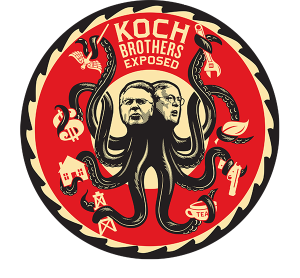 what they went after with their funding.
what they went after with their funding.
PHAWKER: A lot of this is the guise of charitable giving, you call it “weaponizing philanthropy” — that’s such a great phrase — which is a direct consequence of a tax code that encourages philanthropic giving as a way of avoiding inheritance taxes. How did that loophole get into the tax code and was it intended to be used to disguise political spending?
JANE MAYER: It was intended to encourage philanthropic contributions by rewarding them with tax breaks. It specifically was intended not to be used for political purposes. It was very controversial in the beginning to even have private foundations for rich families because there were great debates about John Rockefeller and whether he should be able to take a tax break or even create a private foundation. At the time, this is around 1900, in Congress critics said that these foundations were going to be a source of unaccountable, perpetual, plutocratic power. They don’t really fit into a democracy, they’re not accountable to anyone but the super rich who are funding them. But there were great debates about it, people don’t really remember this anymore. In exchange for being allowed to set up these foundations, the rules were set that these foundations could not get involved in politics. A century later that they are explicitly involved in politics. They say they are not but they have become huge sources of unaccountable political power and many of the families who are funding them, that have a lot of money and great influence, are taking tax breaks in order to manipulate American politics.
PHAWKER: Can we go through some of these families that you are referencing and briefly explain who they are, where their wealth comes from and what their role they play in this de facto confederacy of plutocrats? Let’s start with the Koch brothers…
JANE MAYER: The Koch brothers are – there are actually four Koch brothers, we only talk about two most of the time because those are the ones that are most politically active and that’s Charles Koch and David Koch. David Koch is the richest resident of New York City, even richer than Bloomberg. Charles Koch lives in Wichita, Kansas. They are each worth about $45 billion and between the two of them, they own almost all of the second largest private company in America. It’s a very secretive company. Americans use their products and don’t even realize where they come from. Koch Industries is a company that makes everything from Stainmaster Carpet, to Dixie Cups, to Georgia-Pacific paper and lumber, to refining a quarter of the oil that comes in from Canada to the United States. It has pipelines, it has coal, it has gas. It’s hugely into fossil fuels and it’s hugely profitable. So that’s one company and one pair of billionaires that has been for the last 40 years, deeply committed to trying to change American politics so that is becomes more right-wing.
PHAWKER: Richard Mellon Scaife?
JANE MAYER: Richard Mellon Scaife is yet another one of these inheritors of great wealth. The Kochs inherited millions of dollars from their father who made the family fortune. They have made many more millions. But in the case of Richard Mellon Scaife, he was the heir to the Gulf oil fortune. He lived in Pittsburgh and many people thought that he probably wouldn’t have amounted to much if he hadn’t inherited this giant family fortune. He was a true believe in far right-wing ideology and he took that family fortune and poured it into trying to change the whole political direction of America. He did it through philanthropy for the most part and according to his own memoir, which I got a hold of, he spent something like $1 billion on this project.
PHAWKER: John Olin?
JANE MAYER: John Olin, again, inherited a company that his father built. It was a chemical and firearms company. He built it up into something that is an enormous private company in America. Olin started something called the Olin Foundation. He took his family fortune and specifically aimed it at American academia in an effort to try to plant right-wing teaching in America’s colleges and universities, which he regarded as too liberal. That’s been very much the thrust of the Olin Foundation.
What I found to be very interesting was that why are these people pouring so much of their private fortune into political projects? In his case, it turned out that his company has been an egregious polluter and had many difficulties with the environmental movement within the modern regulatory state. The company, for instance, left one town in Virginia, it’s called Saltville, Virginia. It’s a ghost town, just so completely soaked in toxic mercury. There were, in all of these cases, reasons why these particular millionaires and billionaires hated liberalism. They didn’t like what the modern regulatory state was doing to their companies and their fortunes.
PHAWKER: They’ve largely succeeded in defanging the regulatory function of the federal government.
JANE MAYER: Well, we still have some decent regulations, but they have gone at it non-stop. Pushing to abolish the EPA for instance. Tying the government up in one lawsuit after another. Working at every level, these are people who looked at American politics systemically and built up a comprehensive plan for changing America that works at the local level, the state level, and the national level. They built up state think tanks of which there are several in the state of Pennsylvania. They built up national think tanks, advocacy groups, legal groups, and finally, they’ve funded candidates in elections. They’ve worked long and hard to knock down any limits to what the super rich can spend in order to exert influence over elections. They’ve been at it at every level.
PHAWKER: That brings us to Citizens United, which basically allows unlimited amounts of money to influence political process with almost zero accountability or transparency. It’s based on two, in my opinion, through-the-looking-glass premises: corporations are people and money is speech. Can you explain the sort of gravity-defying logic of the decision?
JANE MAYER: I have to warn you, I’m not a lawyer. But the decision in Citizens United, there’s a long backstory to it. There’s been a long push that goes back to Powell 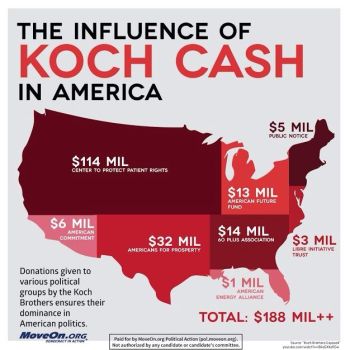 to claim that corporations should have the right to speak. Powell was a lawyer for tobacco companies and he felt that they were not able to make their argument loud enough that cigarettes were good for people.
to claim that corporations should have the right to speak. Powell was a lawyer for tobacco companies and he felt that they were not able to make their argument loud enough that cigarettes were good for people.
There are some roots that are really dubious in this fight. One case after another kept battering down the laws and eventually what really made the difference of course was the Supreme Court in 2010. It wouldn’t have happened without the five justices on the Court who bought into the Citizens United argument. I’ve got to say what they argued at the time though was that money would be visible, you would see all the money spending. Anthony Kennedy specifically said that because we live in the Internet era you are going to see all the contributions online and that the transparency would keep the money from corrupting American politics. They proved completely wrong. The money is not transparent and that’s why this book is called Dark Money.
The money, instead, was almost immediately sidelined through phony charitable groups that claimed to be social welfare groups. They claimed to not be political, but what they actually do is they engage non-stop in pushing the political ideology of their donors. Because they claim to be charitable groups, the donors do not have to disclose who they are so you’ve got secret spending groups that are building up secret banks that are injecting huge sums of money into American politics on their own behalf. That’s the legacy of Citizens United.
PHAWKER: What impact could the death of Justice Scalia potentially have on Citizens United and, for that matter, the entire Koch brothers’ agenda?
JANE MAYER: This could be a seismic change. It was a narrow majority of five to four that decided the Citizens United case. Both of the major Democratic candidates running right now for the Presidency, Hillary Clinton and Bernie Sanders, say they want to overturn Citizens United and if they get the chance to name a Supreme Court Justice, they’ll put one on the court who will overturn Citizens United or is committed to that. It all hangs in the balance depending on who sits on that Court, who the next Justice is that fills Scalia’s shoes. It’s part of the reason I think that this particular fight is so amazingly hard-fought right now and fraught politically. A tremendous amount rests on that seat on the Court.
PHAWKER: Donald Trump represents a very curious X-Factor in all of this. How big a threat is he to the Koch brothers’ agenda and was he ever invited to join this secret cabal of billionaires?
JANE MAYER: I love the word “X-factor” for Donald Trump. He is the outlier on the Republican Presidential candidate slate. He is the only major Republican candidate who has not gone to the Kochs’ donor summits and begged for the huge kitty of private money that the Kochs and their fellow donors have put together. He has been making fun of the other candidates and called them “puppets” for trying to get this vast amount of money out of this group of millionaires and billionaires. He is self-funding instead, for the most part. He, of course, gets a lot of free media so he doesn’t have to pay for a lot of things because he is such a fascinating show to watch. All eyes are glued on him anyway so he’s a challenge to the Kochs. They are reportedly upset about this, they had hoped that 2016 would be the year that they could really fund a presidential candidate who could win, in which case if things went according to their plans they would have a Republican Senate, a Republican House, hopefully a Republican majority on the Supreme Court, and a Republican White House. That is what they have been aiming for in 2016.
PHAWKER: Trump could screw all of that up.
JANE MAYER: He is a Republican, so it’s not that he is a liberal Democrat that disagrees with everything they’re saying. But he’s not following their orthodoxy as the other Republican candidates are. He does side with them on a number of issues, including his denial that global warming is anything that matters, which is an incredibly important issue to the Kochs because their fortune depends upon fossil fuel pollution. On other issues though, he has split with them. Most particularly, the Kochs are completely libertarian about government social services. They want to zero out funding for social security and privatize it. They’ve always been against social security, Medicare, Medicaid. Donald Trump has actually said that Social Security needs to be strengthened not privatized, so he disagrees with them about the social safety net.
PHAWKER: Was he ever invited to any of these annual donor gatherings?
JANE MAYER: It’s hard to know what the truth is. Some people close to the Kochs have said that he was never invited and that’s why he has been disparaging of them. He has been somewhat disparaging of them. More importantly, he’s disparaged the whole corruption of American political money. He has spoken out about big donors twisting politics to serve their own private interests and that because he is so rich, he is not corrupted. I think that has held appeal for a number of voters, just as Bernie Sanders holds a lot of appeal for people who feel like the candidates are bought and paid for. Most Americans, no matter what their political point of view, really don’t like the idea of 400 of the richest people in the country are going to choose the next leader of the country for them.
PHAWKER: Another piece of this is the right wing’s mastery of the dark arts of dog-whistle politics. Thanks to the linguistic legerdemain of people like Frank Luntz, Republicans have managed to convince poor and working-class whites in this country to vote against their own economic self-interest, in effect convincing turkeys to vote for Thanksgiving. How do you undo that?
PHAWKER: I think what you are looking at with Bernie Sanders is, he’s making a case for class issues and economic issues trumping these social policy issues, including racism that has been so useful in convincing working-class whites to vote against their own economic issues in the South. It remains to be seen if the model that Bernie Sanders is using will work, but he has really been a wake up call to a lot of working-class voters.
PHAWKER: Bernie Sanders is pulling back the curtain on how the American people have essentially been locked out of the political process by dark money. He represents an existential threat to the plutocracy because he explains how the game is rigged in very understandable terms and lot of people are actually hearing his message.
JANE MAYER: Part of the reason they are hearing his message – it’s a combination of things. One is the actual reality of the circumstances for a lot of the 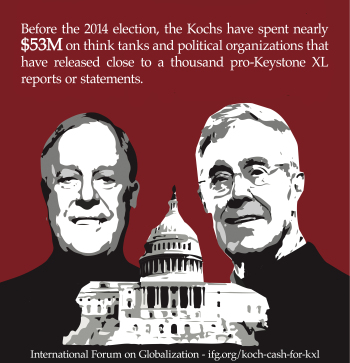 working-class Americans, white, black, Latino, and everybody else. The circumstances are miserable for a lot of people and so the reality is clear to the people that are living these lives that something is going wrong. When they look around, what they see is what Bernie Sanders is talking about, the people on the top getting enormously rich – runaway rich – and also running away with the political machinery. They see that Congress is serving the interests of the donors, not of the voters. It’s a ripe time for Bernie Sanders’ message and it’s not that Hillary Clinton’s message is so different, it’s a lot fainter to people.
working-class Americans, white, black, Latino, and everybody else. The circumstances are miserable for a lot of people and so the reality is clear to the people that are living these lives that something is going wrong. When they look around, what they see is what Bernie Sanders is talking about, the people on the top getting enormously rich – runaway rich – and also running away with the political machinery. They see that Congress is serving the interests of the donors, not of the voters. It’s a ripe time for Bernie Sanders’ message and it’s not that Hillary Clinton’s message is so different, it’s a lot fainter to people.
PHAWKER: What does the Millennials’ embrace of Bernie Sanders’ message augur for the future electoral viability of the Koch brothers’ agenda? Their votes may be cancelled out this election to a certain extent by older voters, but there will come a time where they are the majority and they’ll be determining elections. They are showing where they stand right now, which is in direct opposition to everything the Koch brothers stand for. What do you make of this?
JANE MAYER: While Bernie Sanders is definitely picking up support from the left-leaning base of the party that’s a far different thing from taking over the whole country. It remains to be seen if the movement that’s powering him really has the power to take over the country. I would say this is just incredible drama right now and I would be foolish to try to predict what it augurs or where it ends up. We don’t really know even almost primary to primary what things are going to come out, let alone predicting the future.
I will say that the organization that the Koch brothers and a few other billionaires and millionaires have quietly built is so substantial that you really can’t just say that, “Oh well, it’s not going to have an effect on the country.” They wield incredible influence at so many different levels. A lot of it isn’t immediately visible to the public, because they have purposely hid the money trail. But if you pick up the paperwork that you can find and take a look at the funding streams of one organization after another, and one supposed “citizens’ group” after another, all across the country, you will find that it leads back to this tiny group of terribly rich and terribly right-wing people, who have a minority view that they would like to impose on the American majority.
PHAWKER: Are you optimistic or pessimistic about the future of America?
JANE MAYER: I’ve been covering politics now since I covered Reagan’s White House for the Wall Street Journal so that puts me in this business for quite a long time. I’m actually pretty optimistic. I think that people do have a fair amount of common sense and wisdom. I think that they just need to get the information. People like me who are the reporters, I do it because I believe that if I get the facts to the American public, they are going to be smart about the facts. It’s very hard to get the facts when you are up against people who are so determined to hide their hands. But with this book, I’m hoping that it reaches a lot of people and when they read it they’ll understand what’s going on.
PHAWKER: Is there a through line between your last book, The Dark Side: The Inside Story of How the War on Terror Turned Into a War on American Ideals, and Dark Money? You don’t even have to read be between the lines to see the intimations of creeping fascism that’s converging from multiple fronts.
JANE MAYER: Well, dark is in the title and that is because these books are both about secretive operations that are influencing America without the public really being able to see it. I regard secrecy as a threat to democracy. I think that the public has got to know what’s going on in order to get a handle on the government and on important outside powers like the Kochs. I think the job of reporters is to hold powerful people accountable, especially the secretive powerful people and I think that both of these books aim to do that.
PHAWKER: Do you want to talk briefly about the Koch brothers coming after you? You were investigated by a private detective firm headed up by the former police 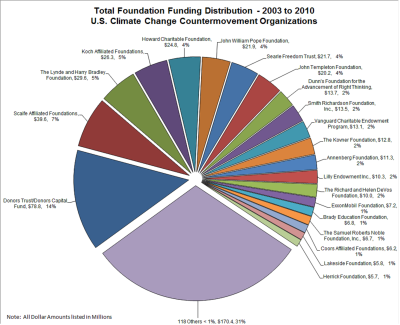 commissioner of New York and his daughter, who is a former FBI agent, if I recall correctly. They attempted to smear you as a plagiarist, in a somewhat ludicrous fashion that fell apart almost immediately. Can you just speak to that?
commissioner of New York and his daughter, who is a former FBI agent, if I recall correctly. They attempted to smear you as a plagiarist, in a somewhat ludicrous fashion that fell apart almost immediately. Can you just speak to that?
JANE MAYER: Yeah, it was eye-opening to me because I’ve been covering politics for a very long time. I’ve covered White Houses and the fall of the Berlin Wall, the Marine barracks being blown up in Beirut, and many dangerous assignments. But I’ve never before had anyone come after me personally the way that the Koch brothers did. They put together kind of a boiler room operation. I guess I should say for legal purposes that it is unclear how directly involved the Koch brothers were themselves, but employees who worked in Washington opened up an investigation into me, where they hired a private eye, as you mentioned, the former police commissioner of New York, Howard Safir. He started digging for dirt and put together an opposition file that he tried to plant in the media, trying to discredit me.
As you said, it did fall apart, it was pretty lame, but I think it gives you an indication, again, of unaccountable power. You’ve got a couple of the richest people in the world who really want to change American politics. They’ve got almost unlimited resources to do so and they play hardball. I think what happened to me was what happened to many people who’ve tried to go up against the Kochs or Koch Industries. They’ve hired private eyes to dig up dirt on FBI agents, on federal prosecutors, on people who worked for the Senate who’ve investigated them. They’ve even hired private eyes to go after their brothers who they’ve been at war with. They are to playing a very intense game of hardball and given their ambitions politically, I think again the public has got to pay attention to this.
PHAWKER: The Koch brothers are worth a combined $100 billion, they are two the richest people on planet Earth, but it never seems to be enough. Their’s is a very literal reading of the phrase “winner takes all the economy” – what’s the joke that you end the book with that Charles Koch used to tell about sharing candy when he was a child?
JANE MAYER: So Charles Koch, whose favorite game when he was a kid was King Of The Hill, is an intense competitor who loves to win. One of his favorite unfunny jokes when he was a kid was when he was called on by the family to share something, he would say, “I just want my fair share — which is all of it.”
Click HERE to enlarge

